

Online students can't help being sociable. 8 April 2014Last updated at 23:00 GMT By Sean Coughlan BBC News education correspondent Online university students want to talk outside the computer screen It was a revolution moving higher education from bricks to clicks… and now it's started to go back to bricks again.

Online university providers, which offered people the chance to study from home, are turning full circle by creating a network of learning centres where students can meet and study together. Instead of demolishing the dusty old classrooms, the online university revolution is responsible for opening some new ones. ICDE: useful papers on open education and MOOC. The International Council for Open and Distance Education (ICDE) recently published a shortlist of reports and papers which were published in the last year.
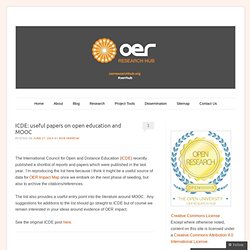
I’m reproducing the list here because I think it might be a useful source of data for OER Impact Map once we embark on the next phase of seeding, but also to archive the citations/references. The list also provides a useful entry point into the literature around MOOC. Any suggestions for additions to the list should go straight to ICDE but of course we remain interested in your ideas around evidence of OER impact. See the original ICDE post here. Like this: Like Loading... Initial trends in enrolment and completion of massive open online courses. Jordan, Katy (2014).
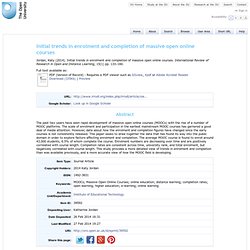
International Review of Research in Open and Distance Learning, 15(1) pp. 133–160. Full text available as: European Journal of Open, Distance and E-Learning. Apostolos Koutropoulos [a.koutropoulos@umb.edu], University of Massachusetts, Boston, [ United States of America, Michael Sean Gallagher [gallagher.michaelsean@gmail.com], Institute of Education, University of London, United Kingdom Sean C.
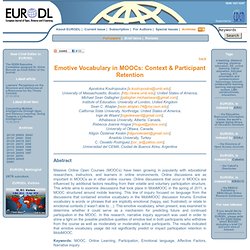
Abajian [sean.abajian.74@my.csun.edu], California State University, Northridge, United States of America, Inge de Waard [ingedewaard@gmail.com], Athabasca University, Alberta, Canada, Rebecca Joanne Hogue [rhogue@pobox.com], University of Ottawa, Canada, Nilgün Özdamar Keskin [nilgunokeskin@gmail.com], Anadolu University, Turkey C. Osvaldo Rodriguez [cor_ar@yahoo.com], Universidad del CEMA, Ciudad de Buenos Aires, Argentina. Initial trends in enrolment and completion of massive open online courses. Katy Jordan The Open University, UK Abstract The past two years have seen rapid development of massive open online courses (MOOCs) with the rise of a number of MOOC platforms.
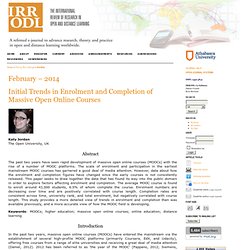
The scale of enrolment and participation in the earliest mainstream MOOC courses has garnered a good deal of media attention. However, data about how the enrolment and completion figures have changed since the early courses is not consistently released. This paper seeks to draw together the data that has found its way into the public domain in order to explore factors affecting enrolment and completion.
MOOCs: A systematic study of the published literature 2008-2012. Abstract Massive open online courses (MOOCs) are a recent addition to the range of online learning options.
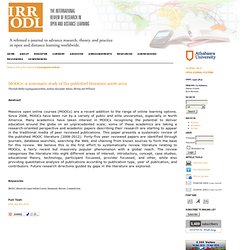
Since 2008, MOOCs have been run by a variety of public and elite universities, especially in North America. Many academics have taken interest in MOOCs recognising the potential to deliver education around the globe on an unprecedented scale; some of these academics are taking a research-oriented perspective and academic papers describing their research are starting to appear in the traditional media of peer reviewed publications. This paper presents a systematic review of the published MOOC literature (2008-2012): Forty-five peer reviewed papers are identified through journals, database searches, searching the Web, and chaining from known sources to form the base for this review.
We believe this is the first effort to systematically review literature relating to MOOCs, a fairly recent but massively popular phenomenon with a global reach. Keywords. Learning in a small, task–oriented, connectivist MOOC: Pedagogical issues and implications for higher education. Jenny Mackness1, Marion Waite2, George Roberts2, and Elizabeth Lovegrove2 1Independent Education Consultant, UK, 2Oxford Brookes University, UK Abstract Despite the increase in massive open online courses (MOOCs), evidence about the pedagogy of learning in MOOCs remains limited. This paper reports on an investigation into the pedagogy in one MOOC - Oxford Brookes University’s ‘First Steps in Learning and Teaching in Higher Education’ MOOC (FSLT12).
FSLT12 was an open and free professional development opportunity for people moving into HE teaching. It was a small course (200 participants registered from 24 countries) which was focused on introducing HE teaching skills, and, uniquely, to deliberately integrate open academic practice as a vital part of professional development for HE teachers. The evidence shows that participants who completed the course were able to learn autonomously and navigate the distributed platforms and environments. Introduction. MOOCs and online learning: Research roundup. The potential of MOOCs — massive open online courses — to provide educational access to all has generated significant interest and no shortage of hype.
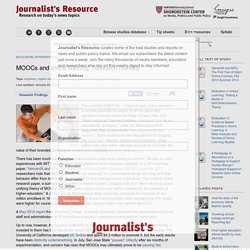
New York Times columnist Thomas Friedman described them as an educational “revolution,” while the Washington Post suggested they could provide “elite education for the masses.” Some businesses see the potential for bridging the “skills gap” between workers and employers, while universities view online offerings as a way to maximize the value of their branded pedagogical content and potentially shore up revenue. There has been much theorizing, but real empirical evidence is starting to come in. Studies on early experiences with MIT’s and Harvard’s EdX platforms have now been released.
A May 2014 report from Teachers College, Columbia University, examines the experiences of faculty, staff and administrators at 82 institutions to assess “expectations and realities” nationwide. MOOC Research.